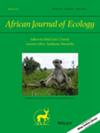Predicting the Dry Season Habitat Occupancy of African Savannah Elephant Using Vegetation Indices and Modelling Landscape Variability in a Mesic Protected Area
Abstract
African savannah elephants (Loxodonta africana) are key ecosystem engineers that migrate over large spatiotemporal scales foraging as they require copious amounts of food and water across habitable landscapes. Therefore a need to understand movement patterns arises in relation to vegetation type and landscape variability, moreso in forage depauparate arid areas such as Gonarezhou National Park (GNP) in Zimbabwe. The objectives of this study were to: (i) assess the performance of vegetation indices in modelling the distribution of African savannah elephants, and (ii) model future landscape variability in Gonarezhou National Park (GNP) in Zimbabwe. Maximum entropy (MaxEnt) algorithm was used to explore the relationship between vegetation indices and distribution of African savannah elephants in the GNP. The Soil Adjusted Vegetation Index (SAVI) performs better relative to other indices in modelling the distribution of African savannah elephants across all habitat types in the GNP. Cellular automata-Artificial Neural Network (CA-ANN) showed a significant future decrease (Kruskal Anova; p < 0.05) in landscape suitable to sustain large populations of African savannah elephants in the GNP by the year 2083. Future remote sensing reveals directional insights into the future consequences of current landscape management for African savannah elephant conservation which is a crucial in the sustainability of climate threatened arid protected areas such as the GNP.

 求助内容:
求助内容: 应助结果提醒方式:
应助结果提醒方式:


